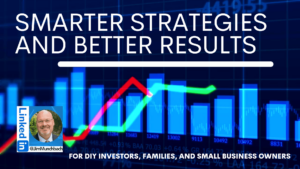Investors Who Panic Make Bad Decisions
What happens when the market has a string of big down days? Well, it had to happen eventually. The Germans have a saying “Trees don’t grow to the sky.”
If you’re one of the Investors Who Panic, you don’t need silly platitudes during times of high volatility and uncertainty.
Investors Who Panic Should Consider the following stories…
1. BayRock Advice from a Certified Financial Planner™ Mentor
In the 1987 stock market crash, the DJIA fell by 508 points, which was 22.6% at the time. My CFP® mentor told everyone on the team: “Get on the phone. Every client gets a call.” You want to get to them before they pick up the phone to call you. Your initiative lets them know you are paying attention.
My CFP® mentor’s advice is wise advice for Investors Who Panic at times like this.
2. Let’s Check the News
The four most dangerous words on Wall Street are: “This time it’s different.” Still, we should check the news just in case. The reality is, the market is always different. So, naturally, something may be different this time.
- Could a giant meteor be heading towards Houston?
- Have the Russians launched an amphibious landing in New York?
- Has an Iranian commander accidentally fired a nuclear missile?
To be safe, we may want to make sure nothing happened overnight that means “It’s the end of the world as we know it.”
Something did happen overnight, but I’m absolutely certain – its not the end of the world as we know it. Not this time.
Overnight, the Center for Disease Control and Prevention confirmed the first case of the coronavirus on U.S. soil with no apparent links to China. Meanwhile the virus continues to spread across Asia and Europe. Global markets have reacted negatively to the news including Stock Markets in the good ole USA. And, bond yields are again testing all time lows.
3. What triggered this sharp stock market decline?
The scariest declines are ones that have no logical reason.
I’ll never forget where I was on May 6th, 2010…
The DJIA dropped 998 points in 36 minutes. The market recovered most of the decline almost immediately. The investors who did some panic selling, lost money.
In most cases, there’s a pretty obvious reason. The Greek debt crisis of 2015. The European debt crisis of 2008. This time is different because we know what’s causing the panic.
4. What is BayRock telling investors?
We have access to an army of highly educated people – most of them are CFAs who live in Austin and work for Dimensional Fund Advisors.
DFA is our primary source of scientific independent investment research.
BayRock leans on our team at Dimensional because they have people on the ground around the world collecting and analyzing data.
BayRock receives constant updates with an endless supply of reliable and independent investment advice from Dimensional, Charles Schwab, and our network of Certified Financial Planner™ professionals around the country.
5. What is the financial press saying?
The Wall Street Journal and other publications have covered the Carnovirus story, reporting some facts and – as always – a little hype. Professional journalists usually report both sides of the story, allowing you to draw your own conclusions.
I’ll be posting some of the relevant stories on our blog. Feel free to send a link to any stories you find especially helpful.
6. No Time to Panic
Good information is one of the best ways to overcome anxiety and that’s the purpose for this post.
7. Let’s take a look at a couple heat maps
Heat maps show a visual representation of the market by sector and industry.
Heat maps help us see what’s going up and going down.
Heat maps help because they show which sectors are leading the decline along with which ones are suffering less or even gaining.
I use heat maps to take a quick look under the hood. Plus, I often find some good news along with some specific opportunities.
8. So, How’s Your Portfolio Doing
I suspect you may be concerned about your holdings. Today’s technology allows you to see values in your portfolio in almost real time.
We’re staying active in managing your portfolio to be sure you’re properly diversified with asset allocation that is correlated with your goals.
While the news may sound very bad, your portfolio is performing as expected.
We’re making minor changes on a regular basis and I’m available to review your goals (and your investments) whenever you like.
9. How long do sharp declines last?
As you know, past performance is no guarantee of future results. However, we also know history has repeated itself.
Here’s one of my favorite charts (along with data from Dimensional) showing stock market performance over time, including shocks to the market and what followed.
At times like this, its good to remember that the market can turn on a dime and investors who miss the first couple of days of an upturn are at a disadvantage in terms of percentage performance returns.
10. What should we do now?
Investors Who Panic will feel like they want to “sell everything.”
It’s your money, but you pay your investment advisor to be the voice of reason at times like this.
I’m on your side and I want to help you stay focused on the big picture.
“Let your investment plan do its job” is always good advice for the long-term. If you have spare cash, adding on weakness is considered a time-honored strategy and that’s part of our process.
My best advice is: don’t panic.
Investors Who Panic may not take the following advice but generally I would suggest the possibility of putting additional money into specific investments at times precisely like this.
At times like this I want to be very clear – especially for Investors Who Panic.
Ultimately, you make you the final decisions in your financial life.
When something this scary happens, I want you to know I’m here to provide guidance and support.
I’m keeping current on what’s happening in the markets and in your portfolio.
I understand how you feel and more importantly, if you’re my client – I understand your situation.
My investment recommendations are always focused on your specific situation.
Its at times like this, I hope to add value to your life, especially if you’re one of the Investors Who Panic.
That’s why you hired me.
Below is a quick link to my calendar.
If you don’t find something that works for you, just send me an email: [email protected] or give me a call at (832) 895-1700.
I promise to make time for you.
TO DOWNLOAD THE REPORT SHOWN IN THIS VIDEO – CLICK HERE NOW.



